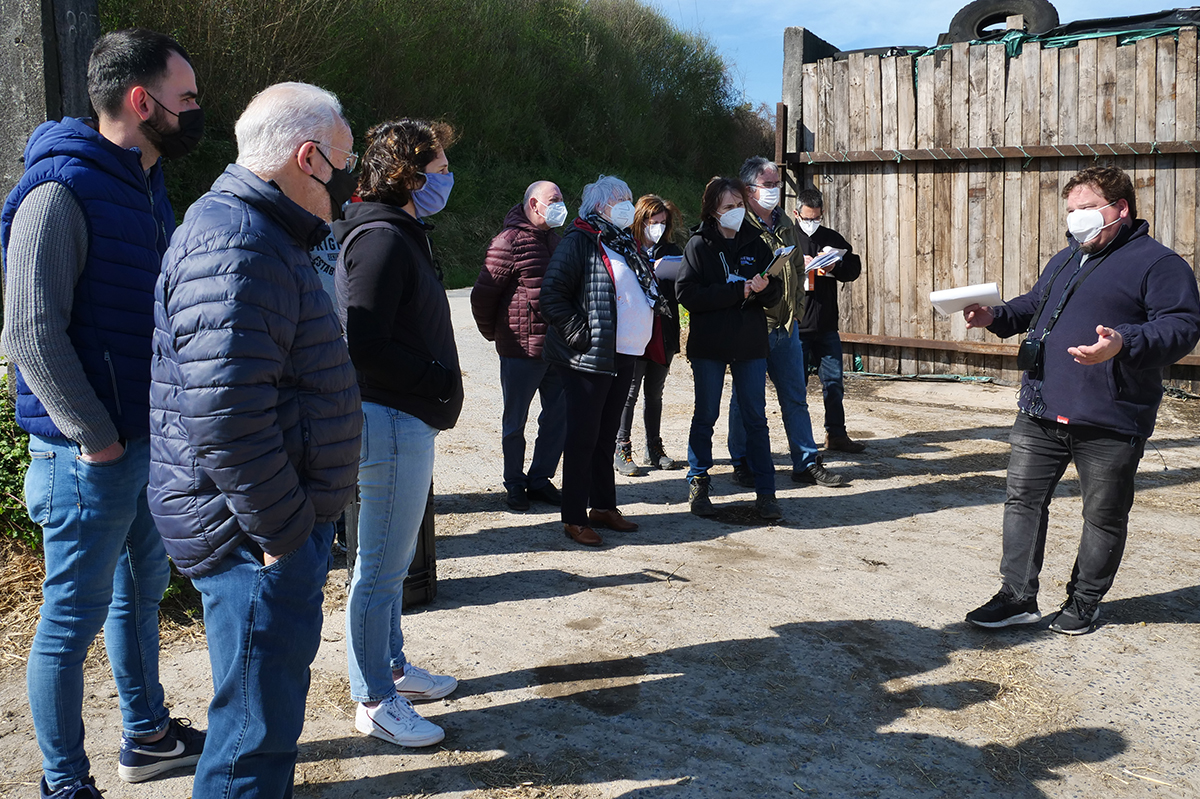NEW
Diary farms open their doors to innovation
24 March 2022Diary farms open their doors to innovation
- NEIKER is participating in the European Dairy4Future project that seeks to propose measures to improve efficiency in the use of resources in the dairy cattle sector
- As part of the project, livestock farmers and technicians in the area have visited the Granja Urruela-Quesería Soloitza in Respaldiza (Álava), a pioneer in the adoption of innovative and sustainable measures
The dairy cattle sector is one of the largest sectors of agricultural production in the Basque Country. Currently, in the Basque Country there are a total of 265 farms dedicated to the production and sale of milk, that sold 176,000 litres in 2020, according to data from the Basque Government’s Department of Economic Development, Sustainability and the Environment. Nevertheless, the constantly rising production costs, in addition to the recent increases in energy and fuel prices, limit the maintenance of some farms.
To be able to counteract these effects, searching for new practices that contribute to the economic and environmental sustainability of farms has become an essential instrument to help dairy farms adapt to this adverse situation and guarantee their future.
In this context, the NEIKER technology centre organised a visit yesterday to one of the first farms to incorporate new measures to achieve more sustainable milk production, the Granja Urruela SC – Quesería Soloitza in Respaldiza (Álava), to show participating livestock farmers and technicians some of the innovations they have implemented.
This initiative is one of the open days organised under the European Dairy4Future project, that works to identify and share various innovations for more sustainable and efficient milk production in the Atlantic Area of the European Union.
As Pilar Merino explains, researchers from NEIKER’s Department of Natural Resources, the innovations they have implemented at this farm are “related to key aspects such as the generational handover, the actual manufacture of dairy products such as soft cheese, yoghurts and blue cheese, as well as the adoption of bioclimatic installations that entail greater efficiency in the use of the energy necessary for their activity both on the farm and in the cheese factory”.
More efficient, sustainable production
The visit to the farm revealed details on slurry management and how the solar panels on the farm provide energy efficiency.
“Slurry is usually used as an organic fertiliser in the fields, but its storage and management are complicated. Therefore, this farm has a system that separates the liquid part, which is used to irrigate and fertilise the fields, from the solids, facilitating storage and transport. As the slurry separator has a high energy consumption, we have solar panels to provide part of the energy they need”, says Enrique Urruela, owner of the Granja Urruela.
After the tour of the farm, the day continued with the visit to the Quesería Soloitza, known for the manufacture of dairy products such as soft and blue cheeses, as well as yoghurts. Within the cheese factory, the participants were able to find out first hand about the new bioclimatic installations implemented such as the high-efficiency cooling equipment or the geothermal system that, among other benefits, enables greater efficiency in the use of the energy necessary for their activity.
About Dairy4Future
Funded by the EU Interreg Atlantic Area programme, the Dairy-4-Future project aims to increase the competitiveness, sustainability and resilience of dairy farms in the Atlantic area. Its objective is to identify, evaluate and share innovative practices with European dairy technicians and breeders.
The initiative, which was launched in 2018 and will end in 2022, focusses on four key issues: analysing the strengths and weaknesses of the dairy sector in the Atlantic Area, fostering economic resilience, improving resource use efficiency and determining sustainable dairy systems for the future.
This project is being conducted by 5 countries of the Atlantic Arc (Ireland, United Kingdom, France, Spain and Portugal), that represent 20% of the dairy production of the 28 countries that make up the European Union, and around 100,000 farmers, in addition to a great diversity of dairy production systems.
Similarly, the project provides a response to one of the biggest challenges of the Basque Government’s Department of Economic Development, Sustainability and Environment: increasing the competitiveness of the primary sector in the Basque Country, seeking innovative solutions that help guarantee the economic and environmental sustainability of dairy farms.



